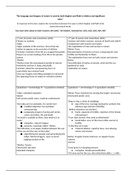‘The language and imagery of nature is used by both Hughes and Plath in distinct and significant
ways.’
In response to this view, explore the connections between the ways in which Hughes and Plath write
about the natural world.
You must write about at least 4 poems. 60 marks / 60 minutes. Assessed on: AO1, AO2 ,AO3, A04, A05
1st pair of poems and connections (AO4): 2nd pair of poems and connections (A04):
Flowers as symbols Summer and winter seasons- seasons of death and rebirth
Tulips Comparisons with women and nature
Tulips symbolic of life and love, forces that she The exploitation of men and women in nature
wishes to oppose as she searches of oblivion Winter Trees
Feminist: reminder of her life as a trapped housewife, Representation of women as trees, comparing her own
flowers as a cruel mocking of her life in the private- fertility and femininity to theirs.
sphere. The exploitation from men on both nature and women.
Thistles Barley
Thistles invert the stereotypical symbol of natural Personification of barley as female, wind and the sun
femininity and turn it sharp and phallic. gendered as male.
Feminist; about the overpowering force of Celebration of nature
masculinity over woman hood.
Uses war imagery and Viking analogies to represent
the opposing forces of nature in constant combat.
Quotations + terminology (4 – 6 quotations needed): Quotations + terminology (4 -6 quotations needed):
Tulips: extended metaphor Winter Trees: Quintets but varying line length- no journey
Septet Omniscient poetic voice
First person poetic voice, could be confessional.
‘Ring on ring, a series of weddings’
'the tulips are too excitable, it is winter here' ● Age of the tree, marriage (polysemic symbol), link
● modified adjective 'too excitable'- between age and lack of fertility.
overpowering ‘Neither abortions nor bitchery’
● juxtaposing images of spring and winter, ● Harsh, opposite of fertility, rejection of the female
colour and white, life and death. role perhaps?
'my body is a pebble to them, they tend to it as ‘Truer than women, they seed so effortlessly!’
water' ● Excalmative, envy of the trees (other women’s)
● metaphor, natural imagery. fertility.
● passivity, inanimate object- lifeless ‘In this they are Ledas’
'flat ridiculous, a cut-paper shadow between the eye ● Classical allusion, raped by Zeus, men abusing
of the sun and the eyes of the tulips' nature and women.
● objectifying the speaker and personifying the
tulips. Natural imagery, 'eyes' as harsh Barley: irregular stanza structure, no regular rhyme
judging symbols of life. scheme.
Journey
Thistles: Tercets
Omniscient narrative ‘Every grain is a sleeping princess’
Extended metaphor ● metaphor, female personification
‘If it were not for the sun, who visits them daily, (...) with





